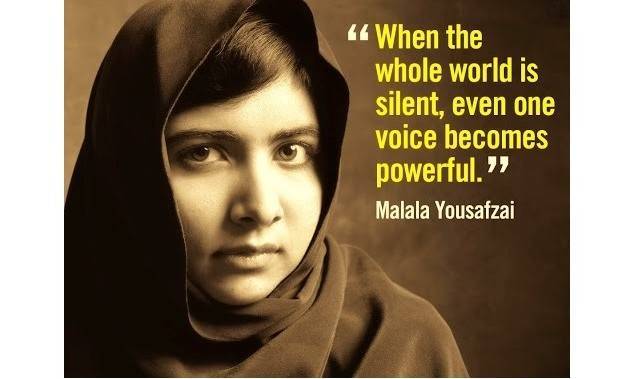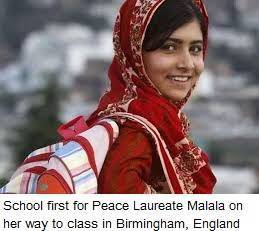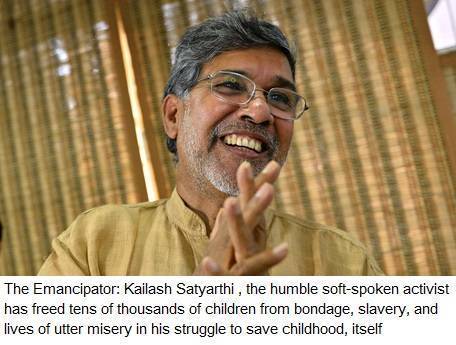Malala and Nadella: A portrait in contrasts

“for their struggle against the suppression of children and young people and for the right of all children to education” – Nobel Committee
Malala and Nadella: A portrait in contrasts on the plight of women
By SB Veda
CACLUTTA – The Nobel Peace Prize has long been used to make a point – and in the process, the prize has lost luster and significance. Those who had commanded others to kill, break bones, assassinate, their sins against peace forgotten, were honored on the shake of a hand. When the Laureates returned to the fight or some less savage political version of it, the prize could not be rescinded. Names like Kissinger and Arafat come to mind. Barack Obama was awarded the price in 2009 at the very beginning of his presidency before he had anything to show for his foreign policy.
This week, the Nobel Committee went a long way to restoring their reputation by honoring Malala Yousafzai, a brave girl, who detailed the plight of young women living under the terror of the Taliban when others were too afraid, and became an advocate for female education at great peril to her personal safety. This too, long before she was old enough to vote, drive and, well…do other things.
The Swat Valley in the frontier lands of Pashtun Pakistan was overrun by the Taliban in the aftermath of the Afghanistan war, and the terrorists had banned girls from going to school. Six years ago, the BBC Urdu service wanted someone to write about what it was like to live under these conditions – and Malala, then aged only 11, started blogging for them under an assumed name to protect her identity.

A New York Times reporter made a documentary film about Malala, and she started to give interviews. Her efforts garnered her a bullet to the head, the masked Pakistani gunman identifying her through a silenced inadvertent glance of a classmate on a bus.
Incredibly, she survived being rushed to the UK for treatment. But, unable to return to her native Pakistan, she relocated to Birmingham where she continued to write and bring attention to her cause – and in the process to the cause of the oppressed women of Islamic cultures.
She started a fund for female education called the Malala Fund, and wrote an account of her experience called I am Malala (published by Little Brown & Co.), the name being a reference to her being able to step out of the shadows of fear from where she had been required to express herself.
The Nobel Committee has taken a bold step in recognizing her. The decision demonstrates that the importance of an issue and the enormity of having courage can be at least as profound in the human experience as a lifetime of service. Not to ignore the latter, they honored in the Indian, Kailash Satyarthi that very ethos, who at 60, has devoted decades to doing just that in the struggle against child labor in India.
For more on his compelling story and reaction to sharing the prize with Malala, please click on the following link for more on Mr. Satyarthi:India’s Nobel Peace Laureate to Join Hands with Pakistan’s Malala
 The choice of a Pakistani and an Indian is deliberate – recognition that those inhabiting lands parted by a targeted border are human beings, whose problems are shared across the sub-continent – that they would do better joining hands across boundaries in a way that their political leaders have failed to cross.
The choice of a Pakistani and an Indian is deliberate – recognition that those inhabiting lands parted by a targeted border are human beings, whose problems are shared across the sub-continent – that they would do better joining hands across boundaries in a way that their political leaders have failed to cross.
Moreover, in recognizing Mr. Satyarthi rather than a high profile ‘white’ person, the Nobel committee is correctly shining a light on India’s civil society institutions, which are doing good work.
While many in Pakistan feel proud of Malala, and the diaspora community in the UK is supporting her, other voices are greeting the news with heaps of scorn. Tariq Khattack, editor of the Pakistan Observer newspaper, actually condemned it, telling the BBC: “It’s a political decision and a conspiracy.”
“She is a normal, useless type of a girl. Nothing in her is special at all. She’s selling what the West will buy.”
This writer notes that journalism in Pakistan is replete with clever articulate men, many of whom soil their pants at the silent mouthing of the letters ‘ISI’, the powerful spy agency, which keeps most journalists under their thumb. They kept their pens safely capped while this ‘ordinary girl,’ bravely wrote the truth.
Case in point – the editor of a Mingora-based newspaper from where Malala hails, some months ago, wrote, “The Americans and Malala’s father conspired to get her shot so she can become a hero.”
Mr. Khattack even felt the need to vilify Malala’s father in his BBC interview.
“Her father is a good salesman, that’s it, and the daughter has also become a salesgirl, dancing to the tune of the West. They don’t deserve anything,” he said
The reaction is not just confined to the male intelligentsia. The IB Times quoted a housewife from Islamabad, saying. “What has she done to deserve [the Nobel prize]? She may be brave, but she’s only a child. They should have waited 10 years and let her make a mark among the deprived sections of the society.”
O YE OF LITTLE FAITH, WAIT YOUR TURN – IT’S JUST GOOD KARMA!
Technology and business pages, this week, featured the face of Satya Nadella, half a world a way. He is the first person of South Asian origin to become CEO of a multinational billion dollar technology conglomerate, arguably making him one of the most powerful men in corporate America. Mr. Nadella’s appointment was lauded in India as though corporate America was honoring a son of the soil.
I am not sure by what qualities a good CEO is measured, these days, but clearly sensitivity and fair-mindedness are not high among them, that is if Mr. Nadella is judged to embody the norm. He made news this week with a statement on the compensation of female employees of Microsoft, specifically when to ask for a raise, which in his view is NEVER! He counselled a room full of women at an event commemorating women in computing to stay silent, wait, and have faith in the systems that rewards will come – eventually. After all, Human Resource systems are efficient, at least, in the long run, said Nadella.
I wondered if he was channeling the housewife from Pakistan who said that the Nobel Committee should have waited 10 years to recognize Malala’s achievements.
Rather than interpreting or paraphrasing, it’s better to actually read what he said verbatim to Maria Klawe, President of Harvey Mudd College and Microsoft board member at the Grace Hopper Celebration of Women in Computing:
 Maria Klawe: What do you advise women who are interested in advancing their careers but they’re not comfortable with putting themselves up for promotions or advanced opportunities?
Maria Klawe: What do you advise women who are interested in advancing their careers but they’re not comfortable with putting themselves up for promotions or advanced opportunities?
Satya Nadella: The thing that perhaps most influenced me in terms of how you look at the journey or a career…There was this guy whose name is Mike Naples who was President of Microsoft when I joined, and he has this saying that all HR systems are long-term efficient, short-term inefficient. And I thought that phrase just captured it. Which is…it’s not really about asking for the raise but knowing and having faith that thes system will actually give you the right raises as you go long. And that I think might be one of the additional “superpowers,” that quite frankly, women who don’t ask for a raise have. Because that’s good karma. It will come back. Somebody’s going to know that’s the kind of person I want to trust. That’s the kind of person that I want to give more responsibility to. And in the long-term efficiency, things catch up. And I wonder whether taking the long-term approach helps solve for “Am I getting paid right?” Am I getting rewarded right?”
Mr. Nadella doing damage control on Twitter, subsequently said he was “inarticulate”. He has since said he was “completely wrong,” adding that, “men and women should get equal pay for equal work”. He also sent out a memo to Microsoft employees saying that those think they deserve a raise should ask for one.
The irony of Mr. Nadella’s comments is that he may well have spurred more women to do the opposite of what he originally advised in the company he heads, causing management to deal with the politically thorny issue of whether or not to say ‘no’.
Still, it is telling that Mr. Nadella, surely having faced challenges as a person of color climbing the ladder in the US business world, could deal so callously with a historically deprived group, as those among them aspired to greater heights. The egregiousness of his gaffe seemed to lie not only in the text itself but also in the fact that he was so obviously oblivious to just how horrendous a statement it was!
Even the way in which he spoke about women, talking about their “superpowers” was reductive, demonstrating that he viewed them not so much as colleagues (let alone equals) but as comic book caricatures. And in the process, Mr. Nadella has become one, himself – the sexist geek technology boss, who doesn’t know how to talk to women.
Claire Cain Miller of the New York Times summed up the problem succinctly in her Uphsot column, “the furor highlighted one of the country’s biggest workplace paradoxes: Even as women are becoming more educated than men and achieving higher career levels than ever before, they are still treated differently at the workplace, including receiving median pay of about 20 percent less than their male counterparts.”
When the female employee negotiates, she is perceived to be ‘bitchy’ compared to men who are expected to be assertive. This can result in a backlash against them and it often does. Mr. Nadella, himself, said he would trust someone who would stay silent, adding “that’s the kind of person I want to give more responsibility to,” – the doormat.
FROM THE BUS TO THE BOARDROOM: OUT OF THE DARKNESS BUT INTO THE SHADOWS
So, this week, we highlight the contrasts in the plight of women between the countries of haves and have-nots. While courageous young women like Malala must literally dodge bullets to get an education and speak up for their rights in oppressive male-dominated regimes, educated women, often having more advanced degrees than their male colleagues, in the United States are told to keep quiet and be patient – the equivalent of the derisive phrase: ‘don’t get your panties in a bunch.’
While the Nobel committee is to be lauded for having vision that clearly, Mr. Nadella lacks, the plight of women remains ever present in society regardless of where they live and work.
The manifestation of the challenges in The West is simply a lighter shade of the same darkness. However it is judged to be in comparison, whether mild or acute, it is still oppression.
Satya would do well to read Malala’s book, specifically the passage, which says, “When the whole world is silent, even one voice becomes powerful.” Maybe then, he can talk seriously about what is or isn’t ‘good Karma’.
 The Global Calcuttan Magazine
The Global Calcuttan Magazine
Interesting take on these events. I like you you made the connections. It didn’t occur to me. Very nice.
It is good she is recognized but so many are doing so much with no fame.
I couldn’t believe Nadella’s statements. As a Hindu I’m offended by him saying that women not asking for raises is good karma. Let’s see what karma he earns with his words!